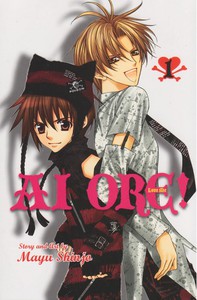Review
by Rebecca Silverman,Ai Ore!
GN 1
| Synopsis: |  |
||
Mizuki is the masculine guitarist in an all-girl band. Akira is the princess of his thuggish all-boys school. He likes her, but he has to wheedle his way into both her heart and her band and convince her that she has enough feminine qualities to be a woman, specifically his. |
|||
| Review: | |||
Mayu Shinjo used to work for Yuki Yoshihara (author of Butterflies, Flowers), and it shows. When it comes to ridiculous romances, Yoshihara is probably the only mangaka who can top her. The premise of Ai Ore is nothing we haven't seen before, even in the relatively limited scope of English language releases – the heroine looks like a male and the hero looks like a female. But Shinjo's gift to storytelling is the way she can milk drama – both melo- and genuine – out of her story and keep you reading even when you start to suspect that you've read this before. One of Shinjo's strengths is her knowledge of the conventions of the romance genre. Whether you've read shoujo romances or flat out romance novels, the avid reader knows that the heroine of a romance must be entertainingly naïve about love. Mizuki takes this one step farther. She has spent her life in a largely man-free world, attending the prestigious St. Nobara Academy and living at home with her mother and sister. She proclaims, “I hate men. They're bad for my health.” Her reasoning for this? When she encounters men,she says, “my heart starts pounding...when he talks to me, I feel feverish...and if he gets close, I have trouble breathing.” Hmm. To most of us, that would signal a perfectly normal attraction to the opposite sex. Mizuki sees it as an allergic reaction. We've seen male/female allergies before in manga, but Shinjo points out the naivete behind the convention. Of course, the other side of the clueless heroine is the aggressive, almost predatory hero. Akira is definitely that. “I came to take advantage of your sadness, Mizuki-chan,” he announces before grabbing her face and kissing her at the end of the first chapter. Before the end of the volume he has pushed her down, locked her in the music room with him, and tried to have sex with her no fewer than three times. “Instead of singing about love, drown yourself in me,” he tells her. (Incidentally, this is the full Japanese title.) This is a pretty typical hero for Shinjo, although he is very tame when compared to some of her earlier heroes. His forcefulness is a bit off-putting, however, and may make some readers uncomfortable. Speaking of discomfort, Ai Ore has definitely earned its older teen rating. In the last quarter of the book, rape becomes a prevalent theme, with both hetero and homosexual rapes nearly taking place. (The former may actually happen – the volume ends before we can find out.) Shinjo has never shied away from using sexual violence in her work, and while there are other series currently being published in English (and by Viz) that employ rape themes, Shinjo's treatment of the subject is more visceral. This isn't rape romance – this is using sex as a weapon. That could make its use in a romance story slightly more acceptable. Shinjo isn't romanticizing rape in this series, but it is still disturbing and Akira's part in it may still put a pall over the story for some. Despite the mature themes, Shinjo's art is delightfully sugary. Her characters have a certain cuteness about them, particularly the feminine ones, and the masculine characters often blush or preen, or do other entertainingly unmanly things to give them an adorable air as well. Because of the story's premise, many of the females look like males, with most of Mizuki's bandmates having a decidedly masculine design. It takes some getting used to but doesn't really detract. Interestingly most of the background characters are drawn by Shinjo's assistants. This creates a sort of disconnect from the surroundings, as if the main characters are performing a play against a backdrop. It's worth noting that this portion of the series was originally published in Shogakukan's Sho-Comi magazine, while later volumes first appeared in Asuka. Shinjo split with Shogakukan midway through publishing Ai Ore, so there's a good chance that the overall tone of the story, or at least the racy bits, will undergo a change partway through, as Sho-Comi is a much sexier magazine. So if you like the main story but are turned off by some of the more mature elements, it still may be worth sticking around. Is this Mayu Shinjo's best work? Not really. Is it still a fun read? Absolutely. Ai Ore is the kind of book that beach days were made for, with just enough tart mixed into the sweet to keep your teeth from rotting. It has its disturbing moments, yes, and it certainly isn't a great work of literature, but if you like a forceful romance, this is the book to take for your lazy days by the pool. |
| Grade: | |||
|
Overall : B
Story : B-
Art : B
+ Fun story, relatively fresh take on an old premise, laugh-out-loud funny in a few places and delightfully steamy in others. |
|||
| discuss this in the forum (5 posts) | | |||
| Production Info: | ||
|
Full encyclopedia details about Release information about |
||